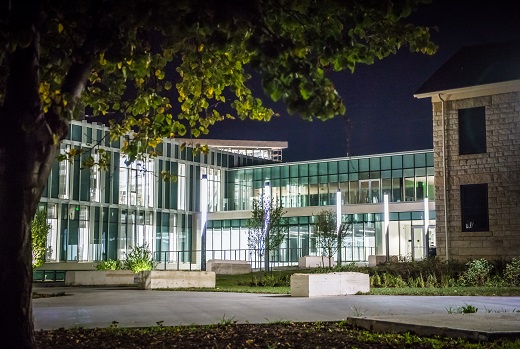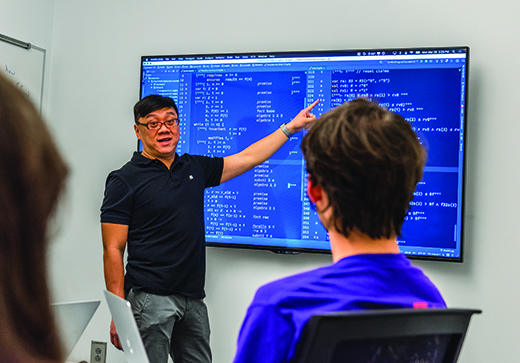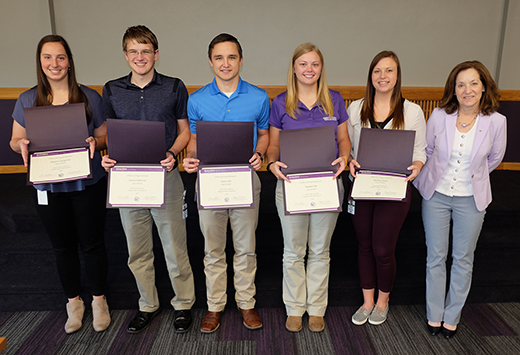10/10/18
K-State Current - October 10, 2018
K-State Current is a weekly news update for the Kansas Board of Regents to apprise the Regents on a few of the many successes and achievements made by K-State faculty, staff and students.
K-State News
The U.S. Economic Development Administration has designated the Advanced Manufacturing Institute of Kansas State University as part of its University Center Program. This designation is a collaborative initiative of the university and the Kansas Department of Commerce to boost development of new products and technologies in the state.
The initiative will provide $1.6 million over five years to assist entrepreneurs and existing businesses in Kansas with strategic planning efforts to identify and overcome the technical challenges faced in new product and technology development.
"The Economic Development Administration's support helps our efforts to more deeply engage with organizations across the region to provide a new level of technology development services," said Jeff Tucker, executive director of the Advanced Manufacturing Institute. "As technologies continue to evolve and prototyping processes improve, our organization is assuming a lead role in assisting companies, entrepreneurs and researchers in the front-end development of new products and technologies. Our staff can significantly reduce the cost and time required to develop and launch new technologies.
This new public-private partnership focuses on providing an integrated innovation-based economic development approach to help Kansas entities become more competitive by engaging applied research and development, supplying technology scouting/management, and streamlining the technology development process, Tucker said. Rural communities and regions will also directly benefit from several new regional innovation ecosystem development services, thus strengthening critical innovation ecosystem elements and building new regional collaborations.
These efforts will advance regional strategies, assist technology-based specific businesses, generate investment in the regional innovation infrastructure, increase job creation and close skill gaps to rebuild an industrial commons infrastructure, Tucker said.
"We are pleased about the collaborative effort and economic impact this grant will have on the state, including opportunities for Kansas businesses to develop new products, expand their businesses and increase the size of their skilled workforce," said Wade Wiebe, director of workforce innovation, Kansas Department of Commerce. "The collaboration between our agency and Kansas State University will help continue the modernization and growth of businesses in Kansas."
The Advanced Manufacturing Institute provides a broad range of engineering and business development services to both private industry and university researchers to advance the commercial readiness of new products or technologies. Additional information can be found at k-state.edu/ami.
Marketing innovations drive growth in freshmen enrollment at Polytechnic Campus
 A new strategy for growing enrollment at Kansas State University Polytechnic Campus is showing strong results and has produced the largest class of new freshmen in five years. Full-time equivalency and headcount at Kansas State Polytechnic are similar to fall 2017, as the campus had a large graduating class in May.
A new strategy for growing enrollment at Kansas State University Polytechnic Campus is showing strong results and has produced the largest class of new freshmen in five years. Full-time equivalency and headcount at Kansas State Polytechnic are similar to fall 2017, as the campus had a large graduating class in May.
"Growing enrollment has always been a focal point, but last year we re-examined our strategy and made some significant changes, which have had a positive influence in a very short period of time," said Alysia Starkey, interim CEO and dean at Kansas State Polytechnic.
New student enrollment in Kansas State Polytechnic's College of Technology and Aviation is up by 34 students from fall 2017, which represents a nearly 50 percent growth in new freshmen. The growth in inaugural Wildcats has positively affected 12 out of the 16 undergraduate degree options. Most notably, the professional pilot program has seen a 118 percent increase in new students from last year, with the flight school portion of the degree at full capacity. Also, on-campus living grew by 32 percent from 2017 and the female and minority populations expanded by 45 and 33 percent respectively.
Starkey said the increases are due to the hard work of faculty and staff and Kansas State Polytechnic's enrollment management and marketing team, led by executive director Christopher Smith, who was hired in October 2017.
Shortly after Smith's hire, Kansas State Polytechnic began implementing an enhanced recruiting strategy centered on three areas: rebuild, grow and transform. Considering the average time it takes to start connecting with prospective students, Smith said he wasn't expecting to see results from the grow portion of his plan until 2019 and believes what the campus has achieved in less than a year of recruiting is remarkable.
"Traditionally in higher education, you need at least 15 months to initiate, develop and nurture a relationship with a potential student, so we fully anticipated seeing the kind of success we're having now in 2019," Smith said. "I am inspired by what this campus has accomplished together in such a short period of time and am excited to watch the continued growth at Kansas State Polytechnic as more and more people learn about the value of what we have to offer."
The revised recruitment approach embraces the polytechnic philosophy of a personalized, hands-on experience from initial inquiry to graduation. The admissions representatives on campus work closely with faculty as well as advisors, financial aid, student support services and career services to provide a lock-step experience throughout the enrollment process.
Another way Kansas State Polytechnic has adjusted its recruiting style is in its communication strategy. Digital marketing is consistently being examined and fine-tuned to connect with students who will find success within the programs offered and the polytechnic learning style.
This fall, Kansas State Polytechnic launched two new undergraduate degree options and one graduate certificate program. Smith said these are examples of how the campus is being adaptive to influence enrollment.
"It's crucial that we are able to respond to what the market is telling us so that we continue to generate more opportunities to grow, and we can do that through program creation," Smith said. "Our faculty have worked hard during the past year to add bachelor's degrees in technology education — to contribute to the demand for more workers in STEM — and robotics and automation because of the direction in which technology is moving. We've also leaned on our expertise in unmanned aircraft systems and initiated a graduate certificate in UAS cybersecurity that will support the expansion of the drone industry."
Pat Bosco, vice president for student life and dean of students at Kansas State University, said Kansas State Polytechnic's enrollment management strategy is one that shows promise for the university as a whole.
"Because of Kansas State Polytechnic's smaller size, it can be nimbler and more innovative in its approaches to stabilizing and growing enrollment," Bosco said. "These are approaches we will look to apply across the entire university."
APDesign again scores top rankings from DesignIntelligence
Kansas State University's College of Architecture, Planning & Design graduate programs in architecture, interior architecture and landscape architecture are once again among the best in the nation, according to annual rankings by DesignIntelligence, the only organization ranking accredited professional programs in architecture, landscape architecture and interior design/architecture.
This year, the graduate program in landscape architecture ranked fourth in the nation overall and first among programs at public institutions. The graduate program in interior architecture ranked seventh nationally and first among programs at public institutions. The graduate program in architecture ranked 20th in the nation and seventh among programs at public institutions.
DesignIntelligence's rankings are based on surveys from 6,119 hiring professionals, 359 deans and department chairs, and 5,451 students in the design disciplines. The primary query of hiring professionals used to conduct the rankings is, "From your hiring experience during the last five years, which programs are best preparing students for a future in the profession?" Deans and department chairs were asked what programs they most admire and students were surveyed on their satisfaction with the educational institution in which they are currently enrolled or graduated from in the past year.
The graduate programs in APDesign also earned high marks or led in the 12 design education focus areas. The graduate architecture program ranked in the top 10 of the 12 focus areas; graduate landscape architecture program ranked in the top three in all 12 focus areas and led in five and the graduate program in interior architecture ranked in the top three in the 12 areas. Information on each of the specific focus areas may be found at di-rankings.com.
In addition, DesignIntelligence has again selected two of the college's faculty members as among the most admired educators in the nation. Tim de Noble, professor and dean for the college and Stephanie Rolley, professor and department head for landscape architecture & regional and community planning, were named to DesignIntelligence's 25 Most Admired Educators for 2018-19. De Noble and Rolley, along with Howard Hahn, associate professor of landscape architecture, were previously honored.
"The college is exceptionally blessed to have two multiyear DesignIntelligence award winners," said Victor Regnier, distinguished professor and associate dean of research at the University of Southern California School of Architecture. "These are based on the outstanding reputations of faculty and the full spectrum of design programs housed in APDesign. To have a dean and department chair receive this award also is clear testament to the high regard APDesign has toward teaching quality and general excellence."
"Once again our programs are in the national spotlight, reflecting the continued excellence of our academic programs, dedication of our faculty, the high bar set by successive cohorts of students and the reputation of our alumni embedded in critical practice," said de Noble. "Perhaps most edifying are the perceived high quality of the more finely grained focus areas, as these align with our traditional strengths and with the uniqueness of our interdisciplinary college."
DesignIntelligence is an independent company focused on the design and construction industry. It publishes DesignIntelligence Quarterly, which includes the results of an industrywide survey of design professionals released in its third-quarter edition annually.
K-State Faculty Highlight
Computer science professors join team effort to thwart effects of cyberattacks
 Development of safety- and security-critical systems that can resist and recover from cyberattacks is of increasing importance for both military and commercial domains such as avionics, medical devices and the internet of things.
Development of safety- and security-critical systems that can resist and recover from cyberattacks is of increasing importance for both military and commercial domains such as avionics, medical devices and the internet of things.
Kansas State University computer science professors Robby and John Hatcliff, and their collaborators at Adventium Labs, Minneapolis, Minnesota, have joined an international U.S. Defense Advanced Research Projects Agency, or DARPA, Cyber Assured Systems Engineering, or CASE, team led by Rockwell Collins, Cedar Rapids, Iowa, to meet this demand.
Their project, "Cyber Assured Systems Engineering (CASE) TA5: Architecture Translation for High-Assurance Embedded Systems with Separation Kernels," will focus on high-assurance, model-driven development of cyber-resilient embedded systems. Total amount of the subcontract is $800,000 for the three-phase period of performance through January 2022.
Other team members include Australia's leading data innovation group, CSIRO's Data61, and the University of Kansas.
"The approach will incorporate Data61's special microkernel that controls system component interactions, thus making security problems or failures in parts of the system much less likely to impact other components," said Robby, the principal investigator on the project.
The microkernel interactions will be verified using computer-checked mathematical proofs that provide high levels of trust and help establish confidence in the critical system's safety and security.
"This project will produce tools and engineering approaches for building high-confidence cyber-resilient systems," Robby said. "Such techniques are crucial for dealing with increasing automation and use of computers and networks in many types of systems."
The undertaking supports goals of Kansas State University and the College of Engineering in research, scholarly and creative activities, and discovery, in areas where faculty members and their research associates perform decidedly visible work on high-assurance and cyber-resilient techniques for safety-, security- and mission-critical systems.
Petillo discusses how US law contributes to trafficking vulnerability
April Petillo, an assistant professor of American ethnic studies, gave an invited talk at the 2018 Racial Violence Hub Workshop Sept. 21 at the University of California, Los Angeles.
Petillo, whose research areas include Native American and Indigenous critical studies and the afterlife of slavery, spoke about her concept of cultural slaving. Using existing anti-trafficking legislation and sexual violence law to provide case studies, Petillo highlighted how the law can create vulnerabilities for Native peoples and African Americans. In her talk, Petillo discussed where legal definitions applied according to race, ethnicity and political status influence the United States' social culture around missing and murdered Indigenous and African American people of all genders. As an anthropological look at how legal history continues to influence current understanding, Petillo's talk suggested potential ways to build better legal interventions to stop trafficking.
The Racial Violence Hub, or RVHub, is a virtual research and teaching network that hosts an annual workshop for its active community of feminist critical race scholars, artists, activists and organizations working on issues of racial violence and the state. The RVHub is founded by Sherene Razack, a Canadian postcolonial feminist scholar, author, and activist of West Indian origin who has examined the systematic racism, violence against Indigenous people and people of color for more than two decades. Based on her work, the Hub regularly addresses the experiences of Indigenous peoples and people of color in the U.S. and Canada. The Hub's goal is to foster research, develop critical pedagogies and share resources for anti-violence practices around state violence against Indigenous and racialized peoples. The Hub does this with attention to "the race line that runs through state violence and terror."
The workshop is a small, invitation-only gathering of participants whose work focuses on these intersections and will become a part of the network. Petillo's invitation to speak is the first time K-State will be represented in this annual workshop and international forum.
K-State Student News
College of Veterinary Medicine announces new class of scholars for Veterinary Training Program for Rural Kansas
 Five first-year students in the College of Veterinary Medicine at Kansas State University have been chosen for the largest veterinary scholarship program offered by the state of Kansas: the Veterinary Training Program for Rural Kansas.
Five first-year students in the College of Veterinary Medicine at Kansas State University have been chosen for the largest veterinary scholarship program offered by the state of Kansas: the Veterinary Training Program for Rural Kansas.
This year's recipients are Natasha Vangundy, Americus; William Patterson, Holton; Whitney Sloan, Lebo; Colton Hull, Stockton; and Shaylee Flax, WaKeeney.
"The Veterinary Training Program for Rural Kansas fulfills an important educational mission and a service mission for the state of Kansas," said Bonnie Rush, interim dean of the College of Veterinary Medicine. "These students completed a rigorous selection process. They will participate in training and complete requirements beyond the curricular requirements of the professional degree program. Scholarship recipients — past, present and future — create a unique community of supportive colleagues and represent the future of rural veterinary practice in Kansas."
The Veterinary Training Program for Rural Kansas was passed by the state Legislature in 2006 to provide a financial incentive for committed veterinarians to serve rural areas in Kansas. Program participants are eligible for up to $20,000 in loans per year to pay for college expenses and advanced training. Upon completion of their Doctor of Veterinary Medicine degree, each student is required to work at a full-time veterinary practice in one of the 91 Kansas counties with fewer than 35,000 residents. For each year the student works in rural Kansas, $20,000 worth of loans will be forgiven by the state. Students can work a maximum of four years through program, receiving up to $80,000 in loan waivers.
The scholars spend time during the summer and breaks in the academic year learning about foreign-animal disease preparedness, natural disaster response, rural sociology, small business management and public health. In addition, they will spend three weeks in a rural veterinary practice during their senior year, applying the principles of small business management to rural veterinary practice.